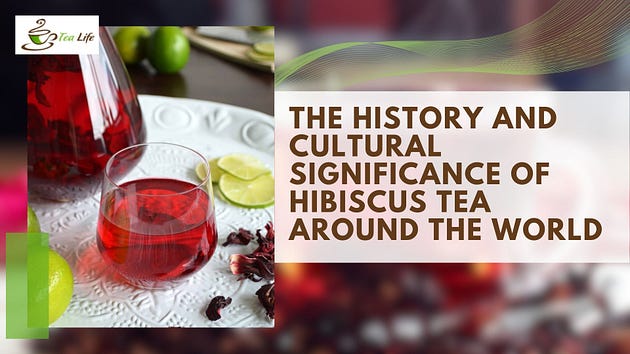The History and Cultural Significance of Hibiscus Tea Around the World

Hibiscus tea, famous for its bright red color and sour taste, has been savored for centuries for its flavor and many health benefits. More than just a refreshing brew, this herbal tea carries with it a long history and cultural significance across the globe. Let’s dive into how Hibiscus tea has become a symbol of tradition, health, and connection around the world.
Ancient Origins of Hibiscus Tea
Hibiscus tea traced its history thousands of years back to ancient Africa. The hibiscus plant, specifically Hibiscus sabdariffa, is indigenous to West Africa, mainly used in traditional medicine, and in ceremonial practices for special occasions. Locals called it “Karkadeh,” and an important part of both everyday and special occasions, the tea was.
The Egyptians drank Hibiscus tea as a cooling agent against the scorching desert sun. According to history, even Pharaohs would drink it and associate it with vigor and health. It then spread along the trade routes into other cultures.
Hibiscus Tea in the Middle East
In the Middle East, Hibiscus tea remains a beloved component of culinary traditions. Known by the same name, “Karkadeh,” it is served at weddings and other celebrations to symbolize welcome warmth, and hospitality.
Due to the taste that leaves an ascorbic feeling on the tongue, people enjoy it in quenching thirst during hot seasons. The health benefits include enhancing digestion and the state of the heart. This is the reason it appears in all households in nations like Sudan, Egypt, and Saudi Arabia.
Asia Hibiscus Tea
Hibiscus tea was introduced to Asia through trade and cultural exchange. In India, the dried petals are utilized in herbal preparations and Ayurvedic remedies for their antioxidant and anti-inflammatory effects.
In Southeast Asia, especially in Thailand and Malaysia, hibiscus tea is enjoyed hot or iced. Known locally as “Roselle,” the drink is often sweetened and mixed with other herbs to create vibrant and refreshing beverages.
Hibiscus Tea in the Caribbean
The Caribbean islands are another hotbed for Hibiscus tea, where it is endearingly called “sorrel.” Hibiscus plants were introduced to the region through the transatlantic slave trade and quickly adapted to the tropical climate, becoming a staple ingredient in festive drinks.
Christmas has an interesting twist: people prepare sorrel, spice with ginger, cloves, and cinnamon, and bring a unique aromatic mixture to the table. For such a long time, through generations, this practice reflects joy and unity.
The Americas and Hibiscus Tea
Hibiscus tea has also gained a place in Latin American cultures. Mexicans refer to it as “Agua de Jamaica” and is used frequently in restaurants and even at home. It can be prepared by steeping dried hibiscus petals and mixed with sugar; it remains a classic accompaniment to fiery dishes, countering its spicy notes.
Hibiscus tea has gained popularity in the United States in recent years. This is because of its health benefits and unique flavor profile. Many wellness enthusiasts embrace it for its rich antioxidant content and potential to support cardiovascular health.
Universal Appeal of Hibiscus Tea
Hibiscus tea’s global journey reflects its universal appeal. Across cultures, it is more than just a beverage — it is a connection to heritage, tradition, and health. From being a royal drink in ancient Egypt to a holiday staple in the Caribbean, Hibiscus tea carries stories of resilience, community, and celebration.
Why Hibiscus Tea is a Must-Try

Hibiscus tea stands out not only for its richness in culture but also for its possible health benefits. It is rich in vitamin C, antioxidants, and minerals, which support immune functions, help in managing blood pressure, and generally bring wellbeing.
The tangy, slightly floral flavor makes it a versatile drink, enjoyable both hot and cold, and easily adaptable to various cuisines and occasions. Whether you’re sipping it during a festive gathering or unwinding with a warm cup, Hibiscus tea offers an unparalleled sensory experience.
Explore the World of Hibiscus Tea with Tea Life
The interesting history and international importance of Hibiscus tea make it a drink that is cherished. If you are inspired to taste this vibrant tea, then Tea Life is the place for you. We sell top-grade Hibiscus tea carefully sourced to ensure that every cup is a journey through its rich cultural legacy and healthful benefits.
Visit Tea Life today and find out for yourself how Hibiscus tea can elevate your tea experience. Embrace the tradition, taste the history, and enjoy the wellness it brings to your life!
.jpg)
Comments
Post a Comment